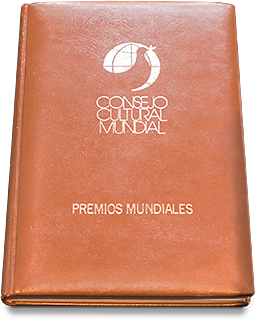The Albert Einstein World Award of Science

The Albert Einstein World Award of Science was created as a means of recognition and encouragement for scientific and technological research and development. It takes into special consideration research which has brought true benefit and wellbeing to mankind.
The winner of the award is elected by the Interdisciplinary Committee, which is composed of world renowned scientists, among them several Nobel laureates.
The prize consists of a diploma, a commemorative medal and an Award Cheque.
Albert Einstein (1879-1955)
In this century, the work of Albert Einstein is the most representative example of the search for the fundamental scientific laws of nature.
He was born in Ulm, Germany on March 14th, 1879. In 1916, he published “The General Theory of Relativity” which advanced twenty years time in contemporary scientific work in the area of theoretical physics. Among his most important contributions to humanity are, besides the above mentioned theory: “The Theory of Brownian Movement”, “The Inertia Principle of Energy”, “The Quantum Law in the Emission and Absorption of Light” and “The Theory of the Specific Heat of Solid Bodies”.
In 1921 he was granted the Nobel Prize in Physics for his Photoelectric Law.

World Award of Science Winners
Winners of the World Cultural Council’s (WCC) World Award of Science are distinguished by several notable characteristics and achievements:
- Groundbreaking Scientific Contributions: These individuals have made significant, often groundbreaking contributions to their field of science. Their research is typically characterized by originality, depth, and a substantial impact on their field.
- International Recognition and Influence: The award recipients are scientists who have gained international recognition for their work, influencing the global scientific community.
- Advancement of Knowledge: They have substantially advanced scientific knowledge, often leading to new understandings, technologies, or methodologies.
- Interdisciplinary Impact: Many of these scientists work across disciplines, and their contributions frequently have implications beyond their immediate field of study.
- Leadership in the Scientific Community: Winners are often leaders in their fields, contributing not only through their research but also through their role in guiding and mentoring other scientists.
- Contributions to Solving Global Challenges: Their work often addresses key global challenges and contributes to the betterment of society, spanning areas like health, environment, technology, and more.
- Sustained Excellence in Research: The awardees typically have a sustained record of high-level research over a significant period.
- Educational Contributions: In addition to their research, many winners are also involved in education, teaching the next generation of scientists and contributing to the dissemination of scientific knowledge.
- Promotion of Scientific Collaboration: They often promote international scientific collaboration, working with scientists across the globe and often participating in or leading international research projects.
- Innovation and Creativity: These individuals are recognized for their innovative approach and creative solutions to complex scientific problems.
The World Award of Science recognizes these individuals for their exceptional contributions to the advancement of science, emphasizing their impact on both their specific field and the broader scientific community.



